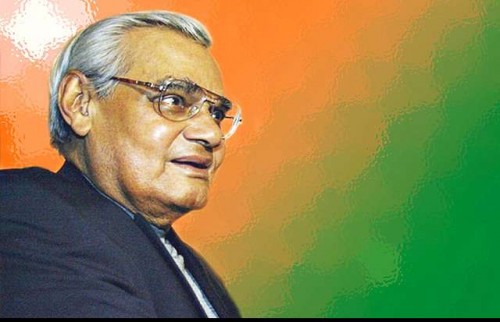
By Ashok Tandon
A 28-year-old dhoti-kurta clad young man was jostling to push his blanket-wrapped baggage into the unreserved compartment of a passenger train at Delhi Railway station on May 8, 1953.
It was a send off for Shyma Prasad Moookerjee, founder of the Bharatiya Jana Sangh (predecessor of the present day Bharatiya Janata Party), on a mission to enter Jammu & Kashmir defying the entry-permit order of the government and demanding full integration of the state into the Indian Union.
On the call of duty was a journalist-turned hitherto unfamiliar political secretary to Mookerjee – Atal Bihari Vajpayee.
Mookerjee was arrested on May 10, 1953 on the J&K border while entering the state and was taken to Srinagar jail.
He sent Vajpayee back to Delhi with a message for the party rank and file to continue the agitation against what he then termed “Ek desh mein Do Vidhan, Do Pradhan, and Do Nishan Nahin Chalenge “(in one country there can’t be two constitutions, two prime ministers & two flags).
Mookerjee died under mysterious circumstances while in custody in Srinagar on June 23, 1953. And young Vajpayee, with his oratorical eloquence relentlessly went on to spread his political mentor’s message across the country and made an indelible mark as a debutant on the political scene of independent India.
Vajpayee entered the Lok Sabha from Balrampur in UP in the second general elections in 1957 and his maiden speech earned him laurels from many contemporary veteran parliamentarians, including the then prime minister Jawaharlal Nehru who, while introducing Vajpayee to a visiting foreign dignitary once said ” this young man one day will become the country’s prime minister”.
Vajpayee remained a member of parliament for 47 years, elected 11 times to the Lok Sabha, and twice to the Rajya Sabha. But the issue of Jammu & Kashmir always remained foremost in his mind. He was a staunch critic of Nehru’s Jammu & Kashmir policy.
A poet by heart, Vajpayee articulated poetry as one of the means of expressing himself in any given situation. He would often recite one of his poems during the course of his speeches to convey his message for the occasion and enthral his audience.
One of his poems on Jammu & Kashmir “Mastak Nahi Jhukega” sums up India’s position on the issue of Jammu & Kashmir.
As external affairs minister in the 1977 Janata Party government, Vajpayee pursued the policy of friendly relations with India’s neighbours, including Pakistan, on the principle of peaceful co-existence & mutual respect. His famous quote “you can change friends but not your neighbours” went on to become a dictum in the Indian foreign office establishment.
Resolving all the outstanding issues with Pakistan, including the issue of Jammu & Kashmir issue in a peaceful manner through bilateral dialogue without any third party intervention was Vajpayee’s mantra when he became the prime minister, first for 13 days in 1996, then for 13 months in 1998 and again for a full five-year term in 1999.
The successful nuclear test “Operation Shakti” in Pokhran on May 13, 1998, was Vajpayee’s strategic master stroke which he defended as a “deterrent” rather than a weapon of mass destruction. He put India in the league of the world’s elite nuclear club yet announced moratorium on future testing. He carried his message of peace to Pakistan during a bus journey to Lahore on February 19, 1999.
The Delhi-Lahore Bus Service Sada-e-Sarhad (Call of the Frontier) was launched as a symbol of the efforts of the Vajpayee government to promote peaceful and friendly relations with Pakistan on the basis of reciprocity.
And now the NDA-2 under the stewardship of Prime Minister Narendra Modi has embarked upon the mission of accomplishing the unfinished agenda of Vajpayee for a terrorism-free prosperous South Asia.
Modi picked up the thread where Vajpayee had left in matters of India’s pro-active policy of improving relations with all immediate neighbours was on display at the very outset of the NDA-2 when heads of all the SAARC member countries were invited to witness Narendra Bhai’s swearing -in-ceremony at the forecourt of majestic Rashtrapati Bhavan in Lutyens Delhi.
Modi, who has always held Vajpayee in highest esteem and considered him his role model, never misses a chance to eulogize the larger-than-life towering personality of this living legend.